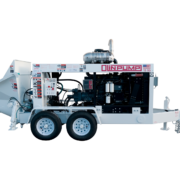How to Choose The Right Concrete Pump
Concrete pumps play a crucial role in construction projects and selecting the right concrete pump will ensure optimal performance and productivity on the job site. With various factors to consider, choosing the most suitable concrete pump requires careful evaluation and consideration. Continue reading to learn how you can choose the right concrete pump for your next construction project.
Understand Types of Concrete Pumps
Concrete pumps have unique capabilities and advantages. Here are the most common types of concrete pumps:
- boom pumps
- line pumps
- trailer-mounted pumps
Boom pumps are ideal for large-scale projects requiring long-distance concrete placement, while line pumps are more suitable for smaller projects with limited access. Trailer-mounted pumps offer versatility and mobility, making them suitable for a wide range of applications.
Evaluate Pumping Capacity and Output
Assess the concrete volume and flow rate requirements of your project to determine the pumping capacity and output needed from the concrete pump. Compare the pumping capacities and outputs among different models so you can find one that can efficiently meet your project’s demands. Other factors such as pump size, horsepower, and delivery rate will narrow down your decision further based on your project requirements.
Consider Mobility and Maneuverability
Evaluate the site accessibility and space constraints to determine the mobility and maneuverability requirements you will need in your next concrete pump. Choose a pump that can navigate the site efficiently and access hard-to-reach areas and consider factors such as boom length, outrigger configuration, and overall size to ensure compatibility with the site layout and conditions.
Review Pump Features and Technology
Look at the features and technology offered by different concrete pumps to determine their suitability for your project. Some advanced features such as electronic control systems, hydraulic components, and remote operation capabilities allow for enhanced efficiency and precision. Additional features like diagnostics and monitoring systems can ensure optimal performance and reliability on the job site.
Assess Durability and Reliability
Construction projects operate in demanding environments, subjecting equipment to rigorous use and challenging conditions. That is why choosing a concrete pump known for its durability and reliability is in your best interest to ensure uninterrupted workflow and minimize downtime.
Durability refers to the ability to withstand prolonged use and adverse conditions without experiencing significant wear or damage. A durable pump has high-quality materials and components that can withstand the rigors of concrete pumping operations. Look for pumps with materials such as high-grade steel, hardened alloy components, and abrasion-resistant coatings.
Reliability is the consistency and dependability of a concrete pump’s performance over time. A reliable pump operates smoothly and consistently, delivering consistent concrete flow and placement without unexpected breakdowns or malfunctions. Reliability is achieved through robust design, precision engineering, and stringent quality control measures during manufacturing. Components such as hydraulic systems, pumping mechanisms, and electrical systems are engineered for reliability, with redundant safety features and fail-safe mechanisms to prevent downtime and ensure continuous operation.
Always examine a concrete pump’s construction and build quality, paying attention to the materials used, welding techniques, and overall structural integrity. Look for pumps that feature reinforced frames, thick-walled tubing, and sturdy mounting bases to withstand the stresses of pumping concrete.
Factor in Cost and Budget
Consider your budgetary constraints and compare the upfront purchase costs of different concrete pump models. Try to get a long view of your overall operating costs, including maintenance and repairs, to determine the cost-effectiveness of each pump option to find the best value for your investment.
Consider Environmental and Safety Features
Assess the environmental impact and emissions of the concrete pump, and prioritize pumps that have eco-friendly designs and features. They should also include safety features such as emergency shutdown systems, safety guards, and compliance with industry regulations and standards.
Seek Recommendations and References
Seeking recommendations and references allow you to gather insights from industry professionals, peers, and pump manufacturers. You can gain valuable perspectives and firsthand experiences that can inform your decision-making process before purchasing a concrete pump.
Peers within the construction industry can also be valuable sources of information when selecting a concrete pump. Networking with other construction companies or colleagues who have experience using concrete pumps can provide valuable insights and recommendations. They may even offer to share their experiences with specific pump models, including their performance, reliability, and any challenges that came up for them.
Don’t be afraid to talk to pump manufacturers and suppliers for their recommendations and references. They can provide detailed information such as technical specifications, features, and performance capabilities. Manufacturers may also offer customer testimonials or references from previous clients who have used their concrete pumps.
When seeking recommendations and references, take into account your specific project requirements, the reputation of the pump manufacturer or supplier, and the credibility of the sources providing those recommendations. By gathering a range of recommendations and references from different sources, you can make a more informed decision when you actually go out and choose the right concrete pump for your construction project.
Choosing the right concrete pump is essential for ensuring efficiency, productivity, and success on construction projects. By defining your project requirements, understanding different pump types, assessing durability and reliability, prioritizing safety and environmental features, and seeking recommendations, you will make informed decisions that drive your business’s profitability and success. Click here if you’re interested in learning more about concrete pumps.



